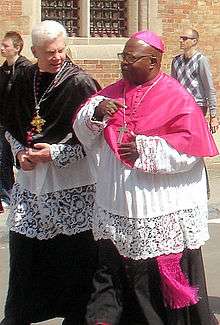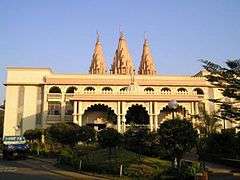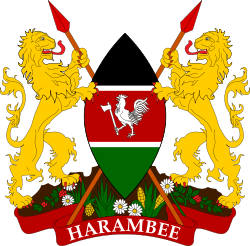Religion in Kenya
| Part of a series on the |
| Culture of Kenya |
|---|
 |
| History |
| People |
| Languages |
| Cuisine |
| Festivals |
| Religion |
| Literature |
|
Music and performing arts |
| Sport |
|
Monuments |
|
Symbols |
|
The predominant religion in Kenya is Christianity, which is adhered to by an estimated 82.6% of the total population. Islam is the second largest religion in Kenya, practiced by about 11.1% of the total population. Other faiths practiced in Kenya are Baha'i, Buddhism, Hinduism and traditional religions.
Buddhism
Since 1999,[2] Buddhism has grown in Kenya. There are more than 1000 Buddhists in Kenya. Buddhism is also one of fastest[3] growing traditions in Kenya.
Nairobi Buddhist Temple
Nairobi Buddhist Vihara/Temple is the main centre of Buddhism in Kenya .Nairobi Vihara conducts missions and meditation[4] programmes to promote Buddhism in Kenya.
Baha'í Faith
Present in Kenya from 1945, the religion grew to an estimated 308,000 people in 2005[5] or about 1% of the population.[6][7] In the 1990s the Bahá'ís in Kenya participated in a nationwide community health project including vaccinations, maintaining latrines and developing clean water sources.[8]
Christianity

Roman Catholicism was first brought to Kenya in the fifteenth century by the Portuguese, and was spread rapidly during the 20th century by colonists. Today, the main Christian denominations in Kenya are Protestant confessions, which make up about 47.4% of the country's religious composition.[9] They include the Anglican Church of Kenya, and the Presbyterian, Reformed, Methodist, Baptist, Lutheran, and Pentecostal churches. The Roman Catholic Church represents 23.3% of the population.[9] Other statistically significant non-Catholic and non-Protestant movements include the Eastern Orthodox Church, New Apostolic Church, Seventh-day Adventist Church, Jehovah's Witnesses, United Pentecostal Church International, and Branhamism. The non-Protestant and non-Catholic groups make up about 11.8% of the population.
The Church of Jesus Christ of Latter-day Saints has more than 10,000 members in 39 congregations in Kenya.[10] They also have 2 family history centres in Kenya, and an employment resource center in Nairobi.[11]
A 2015 study estimates some 70,000 Christian believers from a Muslim background in the country, most of them belonging to some form of Protestantism.[12]
Islam
Islam is the religion of approximately 11.1% of the Kenyan population.[9] Islamic organisations dispute the figures suggested. Some sources suggest the number of Muslims in Kenya between 35% and 45%.[13] Most Muslims in Kenya are Sunni, mostly of the Shafii rite. Approximately 7% percent identify themselves as Shia and about 4% identify themselves as Ahmadi Muslims.[14] Muslims are concentrated mainly in the Coastal and North Eastern Regions. Nairobi has several mosques and a notable Muslim population. There are large and historically significant populations of Swahili Muslims on the coast (most notably in Mombasa, Lamu and Malindi), in the Western Province, and smaller numbers of Somali, Arab and South Asian Muslims.
Religious Shari'ah courts, called Kadhi courts, are given jurisdiction over certain civil matters such as divorce and inheritance under the constitution of Kenya. Muslims have complained that they are targeted and discriminated against by the government, particularly since the 1998 United States embassy bombings in Nairobi and elsewhere. The religions subsiding in Kenya do not display the distinctions between the 42 cultures. They mainly display the traditions of the larger "umbrella" cultures.
Hinduism

There are Hindus living in Kenya. The numbers are estimated to be around 0.14% of the population. They are mainly located in the capital of Kenya, Nairobi, and other urban areas such as Mombasa, Eldoret, Thika and Kisumu.
No religion
In the 2009 Census, 922,128 people reported themselves as having "no religion".[9] This is 2.4% of the total, making this group larger than the groups reporting themselves as traditionalists, Hindu or other religion. 61,233, 0.2%, reported that they did not know their religion. There is a stigma against people who are atheists in Kenya.[15][16] A Gallup poll conducted in 2012 found that 88% of Kenyans considered themselves "a religious person", 9% consider themselves "a non religious person", while 2% define themselves as "a convinced atheist", placing Kenya in top 10 religious populations in the world.[17]
Traditional African religions
African religions are typically based on natural phenomena and reverence to ancestors. The dead are presumed to merely transform into another state of being and capable of bringing good fortune or calamity to the living. Most religious rites are therefore centred on appeasing the dead through sacrifices and proper burial rites. The dead's wishes must also be followed to the letter.
Followers of traditional Kikuyu religion believe Ngai resides on Mt. Kenya and say their prayers facing the mountain. Followers of traditional Mijikenda religion have their holy shrines in the forests where they offer sacrifices and pray.
The Maasai, Turkana, Samburu and Pokot tribes also have significant numbers of persons adhering exclusively to traditional African religions.
See also
References
| Wikimedia Commons has media related to Religion in Kenya. |
- ↑ "Pew Research Center's Religion & Public Life Project: Kenya"
- ↑ "Home Page | Nairobi Buddhist Temple". nairobibuddhisttemple.org. Retrieved 2015-11-10.
- ↑ "How's Buddhism spreading in Africa?". dharmalib.net. Retrieved 2015-11-10.
- ↑ "Special Events And Spiritual Programs At The Nairobi Buddhist Temple | Nairobi Buddhist Temple". nairobibuddhisttemple.org. Retrieved 2015-11-10.
- ↑ Year 2000 Estimated Baha'i statistics from: David Barrett, World Christian Encyclopedia, 2000; Total population statistics, mid-2000 from Population Reference Bureau
- ↑ "WCC > Member churches > Regions > Africa > Kenya". World Council of Churches. World Council of Churches. 2008. Retrieved 2008-04-06.
- ↑ US State Department (2007). "Background Note: Kenya". The Office of Electronic Information, Bureau of Public Affair. Retrieved 2008-04-06.
- ↑ Community health workers in Kenya stir broad changes Volume 7, Issue 4 March – January 1996
- 1 2 3 4 Wycliffe Ambetsa Oparanya (31 August 2010) 2009 Population & Housing Census Results at the Wayback Machine (archived 10 August 2013). Ministry of State for Planning. knbs.or.ke
- ↑ "Facts and Statistics", Newsroom, LDS Church, 1 January 2012, retrieved 2013-03-09
|contribution=ignored (help) - ↑ LDS Meetinghouse Locator.Latter Day Saint Facilities.
- ↑ Johnstone, Patrick; Miller, Duane (2015). "Believers in Christ from a Muslim Background: A Global Census". IJRR. 11: 14. Retrieved 20 November 2015.
- ↑ Al-wayi.org
- ↑ "The World's Muslims: Unity and Diversity" (PDF). Pew Forum on Religious & Public life. August 9, 2012. Retrieved April 2, 2014.
- ↑ "The rise of atheism in modern Kenya". Daily Nation. Retrieved 2013-07-05.
- ↑ "Why We Don't Believe In God". The Star. Retrieved 2013-08-23.
- ↑ "GLOBAL INDEX OF RELIGION AND ATHEISM" (PDF). Retrieved 10 October 2013.
- International Religious Freedom Report 2006 – Kenya, US State Department, 2006-09-15, accessed on 2007-08-31
- History of the World's Religions (12th Edition), Noss S. David: ISBN 978-0-13-614984-2
